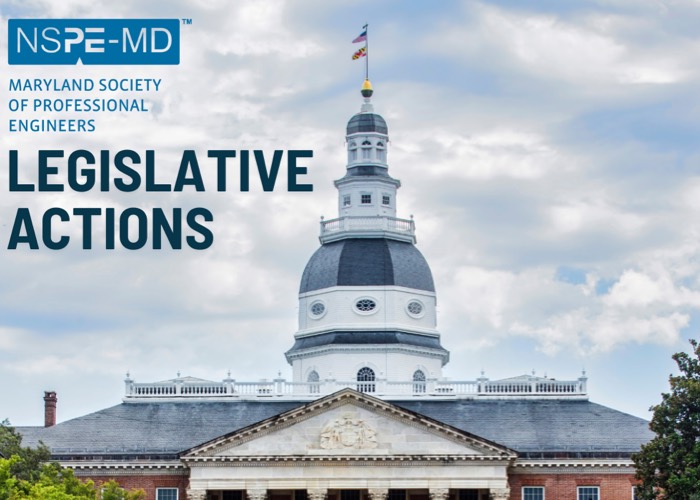MDSPE Legislative Actions
 MDSPE tackles engineering issues in 2024 legislative session
MDSPE tackles engineering issues in 2024 legislative session
From PE licensure requirements and government reviews of proposed developments to who qualifies to install a backyard septic system, MDSPE’s Legislative Committee is following multiple issues during the 2024 session of the Maryland General Assembly.
Licensing issues
Elected officials and state employees are currently dealing with three potential changes to the licensing of professional engineers.
First, a bill drafted on behalf of the Maryland Department of Labor would reduce the experience requirements for an individual to be eligible to sit on the State Board for Professional Engineers. Currently, individuals must be a practicing engineer for at least 12 years and a “responsible charge” for at least five years, amongst other criteria outlined in Section 14-202 of the Code of Maryland.
“The concern is that the requirement has resulted in a board made up entirely of people over the age of 60,” said Tory Pierce, PE, President of Frederick Ward Associates and Vice President of Legislation for MDSPE. “The state would like to have some younger people involved.”
A more diverse board representing the makeup of the engineering community may provide better insight and representation of the issues facing engineers in Maryland, he added.
As drafted Senate Bill 297 would lower the experience requirements to five years each of engineering practice and responsible charge. MDSPE doesn’t oppose lowering the requirements but has suggested that requiring eight years of PE practice and five years of responsible charge would be more appropriate.
Second, the Department of Labor is proposing to both raise the annual fees for PE licenses (possibly by 10 to 15 percent) and require engineering firms to pay between $150 and $200 for new, additional company licenses annually.
“The state would charge fees not just for engineering but for surveying and other related professional services,” Pierce said. “For companies like Frederick Ward Associates, we might have to cough up another $750 or more to practice in all of our fields of service.”
While the state has the authority to raise or add fees, “there should be a waiver process so that it doesn’t become a hardship on small businesses,” said William Zeid, PE, a Senior Associate Project Manager with Gorove Slade, an MDSPE Board Member and a member of the MDSPE Legislative Committee.
Third, MDSPE is once again seeking to update Maryland regulations regarding who is required to pass the Fundamentals of Engineering (FE) exam. Currently, individuals who do not hold an engineering degree but have completed 12 years of engineering work, can sit for the Professional Engineers exam without taking the FE exam. Engineers with a degree must first pass the FE exam before taking the PE exam. While MDSPE is not seeking to remove the non-degree path, it is moving that this path require passing the FE exam, just as all other paths to PE licensure in Maryland require.
“It is in the best interest of the citizens of Maryland to make sure that all practicing engineers have all of those underlying skills before they are licensed as PEs,” Pierce said.
MDSPE members are working to convince legislators of the benefits of a universal FE requirement after legislation which would have created that requirement, failed to make it out of committee during the 2023 General Assembly session.
Septic Professionals
Maryland’s Department of the Environment (DOE) is currently preparing to implement legislation, passed two years ago, that created a Board for Onsite Wastewater Professionals to establish statewide requirements for the licensure of people working on septic systems. The board is already requiring anyone working on septic systems to pay a $150 fee in order to be listed as an approved onsite wastewater professional. It has not yet, however, established the professional requirements for septic workers.
Responding to questions from MDSPE, DOE officials said engineers would have to qualify and pay for Onsite Wastewater Professional licenses in addition to holding their PE licenses. MDSPE is asking the state to remove the additional licensure requirement.
“We hope the new Board of Onsite Wastewater Professionals will recognize licensed engineers as already being qualified to participate in services involving septic systems,” Pierce said. “Licensed professional engineers can design wastewater treatment plants that might discharge into streams, so why would they have to get additional certification to handle septic systems?”
“Civil engineering PEs are held to a requirement that you only apply your seal and work in areas that you are competent in,” Zeid said. “To require a separate septic license for work civil engineers are already doing, whittles away at the worth of a PE. Are they saying they don’t trust PEs to only operate within their bounds?”
Development Reviews
Finally, legislation currently being drafted might streamline the review and permitting processes for some proposed developments.
The draft bill, Zeid said, would require the State Highway Administration (SHA) to complete its review of proposed developments within a set period of time or forfeit the opportunity to weigh in on a project at the entitlement stage. This would not preclude SHA’s ability to review and comment on plans for projects with work within the SHA right-of-way during the Access Permits application process. On some proposed developments in the past, SHA reviews have not aligned with local government review process and timelines, causing delays and challenges in completing development reviews and preparing cases to be heard by local approving bodies.
